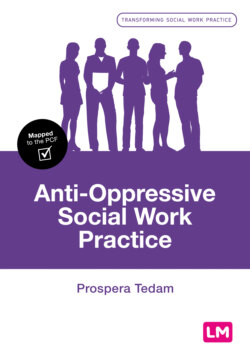Читать книгу Anti-Oppressive Social Work Practice - Prospera Tedam - Страница 17
На сайте Литреса книга снята с продажи.
Types of oppression
ОглавлениеFor oppression to exist there must be two categories of people – the oppressor and the oppressed. These terminologies have been brilliantly examined by Paulo Freire (1970) in his famous Pedagogy of the Oppressed in which he proposes that in order to work harmoniously, knowledge creation should be a shared endeavour in the context of education and the teacher–student relationship. In a similar vein, social workers should not claim to be the experts and must utilise a shared approach when working with service users to meet their needs. This working together has the potential to minimise oppression in the working relationship.
There are different forms of oppression and these are referred to as the four I’s of oppression (Chinook Fund, 2010). They include ideological, institutional, interpersonal and internalised.
1 Ideological Any system of oppression begins with a view or idea that one group is better or more important than another group, or other groups of people. The group that feels superior often associates with positive labels such as strong, intelligent, competent, and it ascribes the ‘other’ group using negative labels such as weak, unintelligent, incompetent.
2 Institutional oppression usually comes from larger organisational acts or omissions which result in people with characteristics being over-represented or in receipt of negative or oppressive outcomes. For example, in the UK there are disproportionate numbers of Black minority ethnic people receiving mental health services when compared to other groups. The reasons offered for this are varied; however, institutional oppression is rarely accepted as the main reason.
3 Interpersonal oppression is the interaction between people where oppressive language, actions and insinuations are used.
4 Internalised oppression works when oppressed people come to believe in their own inferiority. Things reach this point when oppressed groups have nowhere to express their feelings, so keep these inside them (internalised) or direct their frustration towards others of the same group.
